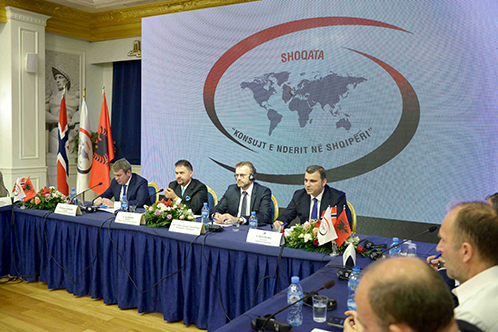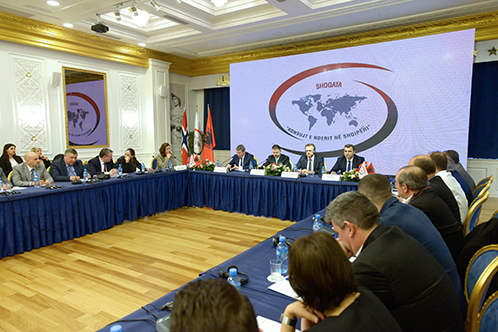BANK OF ALBANIA
PRESS RELEASE
Speech by Governor Sejko at the round table on: ''Energy and Sustainable Economic Development - The Role of Economic Diplomacy''
Publication date: 21.02.2018
Dear Mr Ndroqi,
Dear Mr Minister,
Your Excellency Ambassador,
Dear guests,
I am delighted to be invited to participate and address this round table, taking into account that issues relating to economic growth, sustainable development and the European integration should be seen as integrated and interdependent topics.
I am confident that this round table will help us to identify such interdependence and design integrated development strategies.
Today's economic, financial and geopolitical realities dictate the expansion of the scope of analysis and of the perspective of our economic policies. The globalization process, market expansion and the integration of production chains are challenges that we are facing and will increasingly face in the future. Like any other challenge, it may result beneficial if administered properly; conversely, it may cause cost and loss, if not understood and treated on time. On the positive side, integration and globalization offer financial capitals and enable access to larger markets for developing countries. On the negative side, integration and globalization foster competition between products, companies, and countries.
I would like to share with you today, my personal view on the role and importance of economic diplomacy.
But, before I present my point of view, let me say a few words about the current situation and perspectives of economic development in Albania.
Last week, the Supervisory Council of the Bank of Albania conducted a quarterly periodic analysis on the Albanian economy and financial markets. Based on the available information, we concluded that the Albanian economy continues to be characterized by a positive development momentum.

Economic growth in 2017 is expected to range 3.5%-4%. Demand growth has contributed to production growth, in a virtuous chain of consequences, associated with employment growth, improvement of the financial situation of households and enterprises, as well as the reduction of economic and financial imbalances.
Despite the weaknesses that continue to be present, economic growth is becoming more broad-based. In sectorial terms, the expansion of production has reflected the positive contribution from almost all sectors: industry, services, construction and agriculture. In terms of expenditures’ source, economic growth reflected the pickup in household consumption, the positive trend of domestic and foreign investments, as well as the growth of Albanian exports, in particular the export of tourism services. Lastly, in terms of development policies, economic growth reflected the monetary stimulus and fiscal consolidation, which enabled low interest rates and ample liquidity in the markets, as well as our prudent supervisory and regulatory policies; such policies have enabled a sound and profitable financial system, capable to lend.
The economic and financial stability of the country, the strengthening of growth resources, as well as the improvement of the global economic environment render us optimistic about the future.
Of course, as a policy-maker, the Bank of Albania has a lot of work to do, in order for these positive premises to become a reality. We are aware of this, and I think that our positive record in the past is the proof of our seriousness, dedication and results.
However, from my point of view, I am certain that we can and should do more. Let me identify three main aspects in which economic diplomacy may focus.

Firstly, economic diplomacy should aim at trying to stir up interest to invest foreign capital in Albania. Over the last five years, foreign direct investments were around the average level of 8.7% of GDP, or around EUR 870 million per year, ranking us in the second place in the region, after Montenegro. However, Albania continues to remain the next to last in the region in terms of foreign investment stock and continues to be a country hungry for capital investment in all economic sectors.
Secondly, we must do more to have a better sectorial distribution of these investments. According to the available information, about 23% of foreign investments are concentrated in the energy sector and this is certainly something encouraging for the development perspective of this sector. But, on the other hand, sectors with high development potential, such as the processing industry, have lagged relatively behind in relation to attracting foreign investment.
Thirdly, economic diplomacy can help more promote the made-in-Albania products, i.e. to expand the access to markets and to increase the penetration of our products in these markets.
***
Dear participants,
In conclusion, I would like to add something regarding the energy sector and bank lending for this sector. The banking sector has always been interested in investing for the energy sector.
There have been several legal amendments to the law on concessions, a few years ago. These amendments have provide the legal grounds for investment in the energy sector. Dominated by banks - they account for over 90% of the financial sector- the financial sector has shown a considerable interest in supporting the energy sector through lending for projects of renewable energy, in particular hydro power plants. These loans make up a significant share in loans granted by commercial banks. Certainly, the crises of 2008 and the ensuing shock in the financial sector and the economy tightened the lending criteria for commercial banks. This tightening was present in all sectors, including the energy sector; however, lending continued. Banks continued to support the projects that comply with the criteria and there is consistently an interest in this sector.
Of course, the energy sector matured over time, so it has come to understand which are the risks and what it needs to do in order for commercial banks to support it with lending even more. It is in the common interest of investors in the energy field and commercial banks. This is one of the most profitable sectors, 23% of foreign investments in Albania are in this sector. We expect more investments in the future. The support of the banking sector for the energy sector would be a positive element in attracting foreign investments as investors often seek to share the risk with the Albanian financial system.
As a regulator, the Bank of Albania has supervised and supported the banking sector for it to further stimulate the energy sector as one of the industry's main sectors.
Thank you for this round table and I am happy to answer your questions.

 Twitter
Twitter
 Youtube
Youtube
 Facebook
Facebook
 Flickr
Flickr
 RSS
RSS
 Subscribe
Subscribe
 Feedback
Feedback